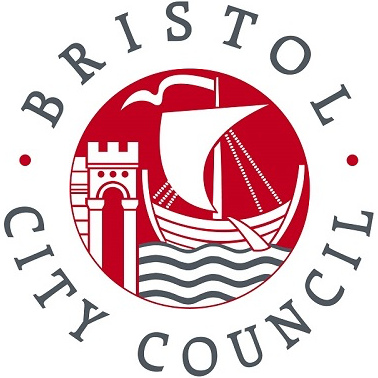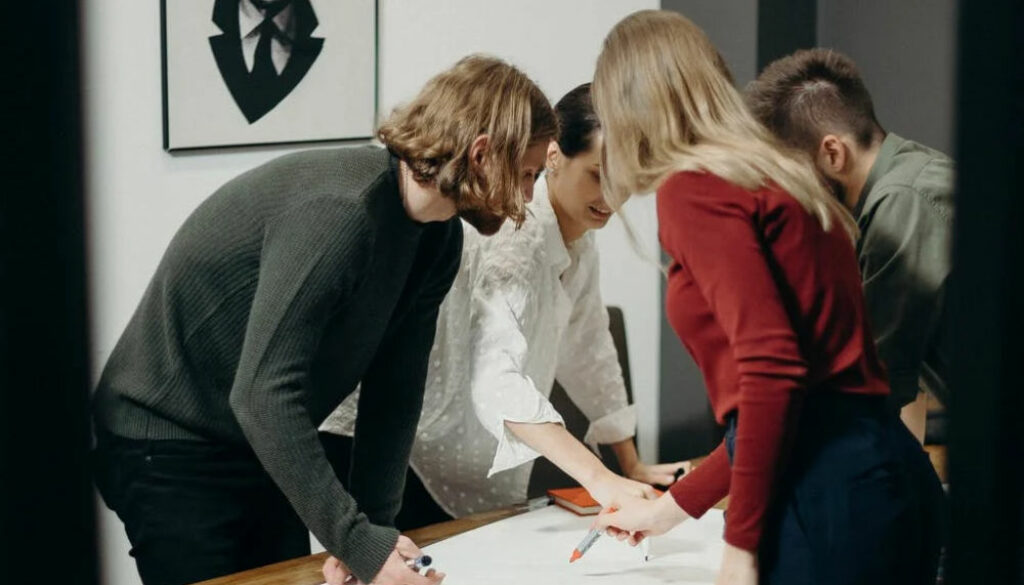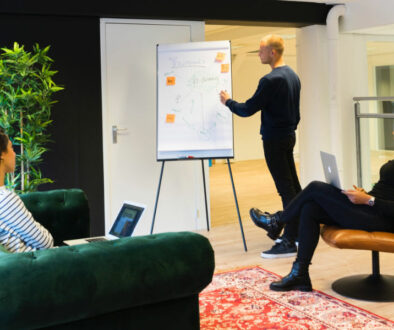Adam’s Story
An interview with Adam Saleh, Apprentice, Employment Support Team, Bristol City Council.
Q: Adam, can you tell me a bit about yourself?

When I was 13 I came to England from Eritrea, a small country in East Africa. That was a long journey – I can’t remember much about it, I was so young. I tried to adapt to UK life. It was so amazing and challenging – a great experience. I didn’t know what to expect. I had to learn about a different environment, different language, different weather, different food, and a completely different culture.
I came to this country with my family, though my mother is in Sudan now, and I’ve got my two brothers here as well. When I was aged 15 I had to go to live with a foster carer in Wiltshire. I had to adapt to a different family life and this distracted me from school because things weren’t going the way they meant to go.
Then I started a new chapter. I had to move to Bristol and I started a new life. I moved in with a new family and I started a new school in year 10 at Bristol Met. This really helped me and I made new friends, and the school and the teachers were amazing. My carer also really motivated me, and I still appreciate them for everything.
They encouraged me to learn English. They encouraged me every day. It didn’t feel like I was living with a carer as they looked after me like I was their son. I felt comfortable and happy, and I forgot about all the problems and issues I had had. I’ve loved Bristol from that time – it was easy for me culturally – Bristol is a very multi-cultural and diverse city.
Q: When you were in school, did you have an idea what you wanted to do?
I didn’t really have any idea what I was going to do. My family always wanted me to be a doctor, but personally I didn’t have that kind of dream. The only thing I had in my mind, back home, my Dad has his own business, and I used to go to his shop. I knew about the money – I was good at counting when I was little and I learned how to handle money. That got me thinking about business, but because my family had wanted me to be a doctor, I studied science BTEC level 2. When I finished school I didn’t get the grades I was looking for in GCSE in English because it wasn’t my first language. In Arabic I got a grade A but my English let me down – and if you want to be a doctor you have to have an A or A*.
Q: So what did you do when you left school?
I joined a Level 2 business course at South Gloucestershire and Stroud College and in my first year I had an opportunity to do work experience in Wiltshire with the Council. My social worker offered to help me because I didn’t know what I was going to do and where I was going. I was living in Bristol so I had to get up early for two weeks to travel to Wiltshire. I had an opportunity to try out different departments – finance, customer service, and accounting. I really enjoyed the work experience – it involved lots of financial calculations.
Taking part in work experience helped me think about what I was going to do – so that was a really important step for me. And I spoke to a careers advisor about what I wanted to do, and the best way to get there. I got advice from college and I found out there was an apprenticeship I could do. I started looking for an apprenticeship and finding out how to apply.
Q: How did you get on applying for an apprenticeship?
That’s was hard – when I was at college I created an account with the government’s apprenticeship website, and I put in my CV, all my information about my education, and I kept on applying, and kept on applying. I applied to over 20 different companies and I got invited to 3 interviews. The first interviews didn’t go well because it was my first time. My confidence went down after this and I really felt down. I quit college for a year and I started working for KFC. At this time I was also kicked out of my flat because I could only stay there until I was aged 21. I had to go to the Bristol Foyer for 8 months. I was struggling a lot – 2018 was the worst ever time for me – no apprenticeship, no college – nothing. Thinking about work and college was stressful – and all the people around me were smoking, drinking and sleeping outside – this knocked me down.
Q: How did you turn this around?
I had good friends from college and they went to university. We used to hang out together – we played football, going out, playing FIFA together. When they were doing assignments, I was just
watching Netflix and they kept saying – ‘you can do more’ – ‘why don’t you start something?’. My carer was also saying ‘you can do it’ and ‘believe in yourself’. So friends and family were backing me and telling me to ‘buck up’. I started to listen to motivational materials on YouTube – and that completely changed my mind. I started to look for an apprenticeship. At this time the Wiltshire Social Service team contacted me and asked me what I was doing; they encouraged me to do something and organised another 3 week work placement. I also saw a lot of employers and they proof read my CV and I changed it 5 or 6 times. Although English is not my first language, there is no problem when I speak to people, but you can find a lot of mistakes in my writing – so I had to get the spelling and grammar checked. I got motivated and I started applying for business apprenticeships again. I had found my passion for this. I had changed my CV. I had done different work experience. I had worked in customer service for BT and I’d also worked for the Share Company. I’d done voluntary work too with care leavers; because I’m a care leaver, I had a chance to speak about my experience – to help and motivate others like me. All this strengthened my CV. I showed that I can communicate, that I like to interact with people as well. This gave me confidence in myself and it made my CV stand out. This time I got lots of phone calls and invitations to interviews.
I applied twice to Bristol City Council for apprenticeships and they rejected me. After the second rejection, another positive thing I did was ask for feedback. Every time I got another rejection I sent an email asking for feedback and the reason why I did not get the position so that I could improve. I told them I would really appreciate their help, I know I’m not perfect, that I just want to improve in my next application. I got quite a lot of replies saying ‘you’re a really amazing guy’ and ‘you’ve got a great CV’, but ‘you need to have English and Maths GCSE grade C’, and ‘you need to have your own car’ and not use public transport. I heard back from 4 or 5 companies that said ‘you can do it’. I also went to different agencies to get support – I went to Catch 22, to YES and to 16-25 Independent People. They all supported and encouraged me – it made me feel I’ve got some strengths and I’m not going to give up this time.
Q: Tell me about your apprenticeship with the Council’s Employment Support Team?
The same day I had an interview here at the Council, I was invited to another interview with another employer. I had to email the Council because there wasn’t enough time to get from one interview to the other. They changed the time so I could get to both interviews. The interview itself was amazing and I got it! I was so happy – over the moon. I started on July 1st in 2019. It’s now a few months in and this apprenticeship is not exactly what I was expecting. A lot of people work in a business type apprenticeship role and they sit in an office all day – doing the same job over and over. I love it because I’m doing a lot of mixed things, and I don’t have to sit at a desk all day. My work covers different things – job fairs, finance, social media – it’s an amazing opportunity with so much learning. I’m getting a lot of knowledge from the unique mix – and that’s what makes it exciting for me. I’m enjoying it. It has surprised me – I wasn’t expecting that – it’s not the way people described it.
Q: What have you learned in your apprenticeship?
I’ve learned about job fairs and about interacting with different organisations and different people. Also I’ve learned how to organise things and about working in a team. I’ve learned a lot about finance and how the process works, how the council pays for supplies. You have to be patient, a good listener, particularly at job fairs. A lot of people they don’t know what they are looking for, you have to give them options, and give them some direction. I’m still learning and there’s a lot to learn. The Council is massive with such a lot of new opportunities, new chances and new things to do.
What makes it more enjoyable also is personally change and learning as well. I moved from a really bad time and have had to become more independent and responsible. I was really scared when I left my carer; how was I going to manage? how was I going to live? When I was in care I had a chance to test things as I knew I was not going to live like that forever. I used the support and people around me. I’ve got my own flat now and that’s a responsibility. I’ve done different courses to get that place and to show that I’m capable of paying my bills, my rent, and my council tax. Also I have to show that I can manage things – it’s a big challenge.
I’m 22 now and when I came to this country I didn’t even know how to cook an egg! Now I’m proud of myself I can cook, I can pay my bills, I can look after myself – and that’s amazing compared to when I first starting living with my family.
Q: What are you hoping to do in this apprenticeship and what next?
My aim is to finish my apprenticeship and my level 3 diploma. My future ambition is to gain a degree in business administration and also I’d love to learn about finance and marketing as that will strengthen my career options. I used to think you can only get a degree by going to university, but now I know that there are apprenticeships to degree, and even higher, to masters level. I’m going to keep learning.
Q: What messages would you give to young people who are working out their options?
With the Bristol WORKS programme I went back to my old school to try and encourage young people who are in Year 10/11. They are in the same position that I used to be. I didn’t know what I was going to do or where I was going. I had a chance to give them positive encouragement to find different solutions and options. I told them about apprenticeships as another route to get a degree and a higher degree. In my time there wasn’t much support or encouragement with careers – and I want to give them that opportunity that I’ve got now.
I told them: ‘I used to go to the same school, and wear the same uniform, and now I’m a completely different person and I’ve been in different situations – worse – bad – then good – but it makes me happy because through all this it’s given me lots of experience and made me stronger.’
I’m trying to be an example, a role mode to them, that’s what you’ve got to do, I’ve been through this, I want you to have the same opportunities, I want you to have better options.
They were so happy, and I was so happy to go back and speak to them – it makes me feel great.
Interview produced: May 2020



